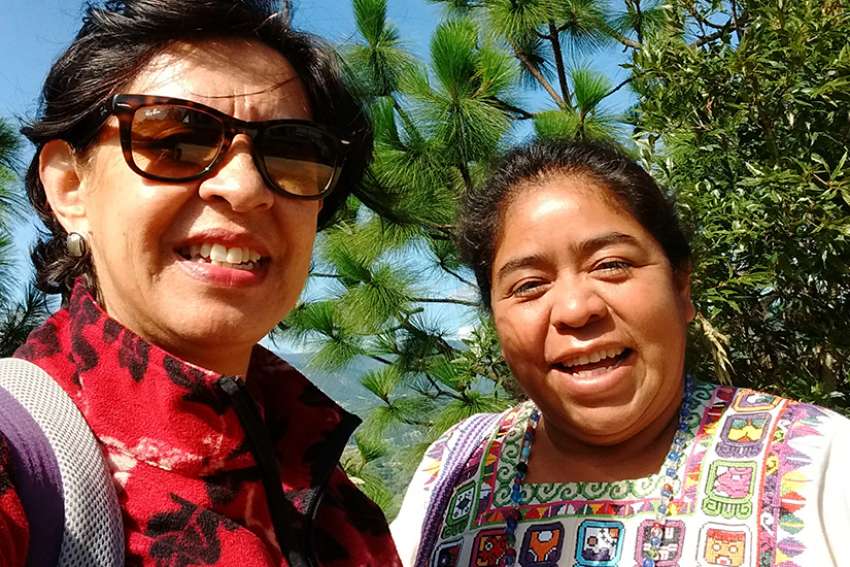The two topics, in fact, dominate conversations with Guatemalan Sr. Maudilia Lopez Cardona, who has been outspoken about the mining industry’s alleged neglect, corruption and human rights abuses for more than a decade.
The co-founder of FREDEMI (Front for the Defence of San Miguel Ixtahuacan) can’t talk about her campaign against a Canadian mining giant without bringing up her parish, God and Pope Francis.
The Guadalupe Sister was recently brought to Canada by Amnesty International to speak to groups about how Goldcorp’s Marlin Mine has changed the lives of women, girls and families in her Mayan Indigenous parish, next door to the town’s now closed mine. Behind Lopez’ criticism is her faith, bolstered by Pope Francis’ 2015 encyclical Laudato Si’.
“When Pope Francis is talking about our common house, our common home, they (parishioners at San Miguel Ixtahuacan) all were just so surprised…. At times we felt like he was writing about us. So that made them so happy,” Lopez said through an interpreter.
For Lopez, who has worked in the parish for more than 20 years, it was as though the traditional Mayan worldview and Catholic theology suddenly had a common language.
“We had already recognized these things,” Lopez said. “We’ve written songs about it. We’ve discussed it in our community. And here he (Pope Francis) is writing about it. That made us so full of joy, because he recognized our struggles. We felt vindicated and recognized when we read this book (Laudato Si’).”
Backing up Lopez’s theological enthusiasm is a position paper released earlier this year by the international Catholic peace movement Pax Christi. The Pax Christi paper on mining in Latin America also cites Laudato Si’, which the peace movement says “magnificently reflects our concerns and the urgency of building a Christian and ethical response.”
Nobody should be surprised the international Catholic peace organization has produced a paper on mining in Latin America, or that it is campaigning on the issue at the United Nations and the European Community, said Pax Christi Latin America and Caribbean regional co-ordinator Martha Ines Romero.
“After more than 70 years of working for peace and justice in many ways and in many countries, in our work for Latin America over the past seven years we discovered that some of the main conflicts that cause suffering and exclusion and poverty in our communities, they were caused by extractives, mainly mining, most of them from Canada,” Romero told The Catholic Register in a phone interview from Peru.
In the case of Goldcorp, FREDEMI has alleged human rights violations, including contamination of fresh drinking water and threats of violence against protesters, as well as structural damage to homes because of blasting. Since the closure of the Marlin mine in May 2017, FREDEMI has been demanding Goldcorp be held accountable for alleged damages. Goldcorp has consistently denied the allegations and says it has made more than $130 million (US) in infrastructure improvements to the local community over the last 10 years.
Some of Lopez’s most bitter complaints are about what happens to a rural, Indigenous, peasant community when 21st-century industry suddenly arrives in a place where there has been no preparation.
“We’re all affected. But historically women are the ones who have been guardians of the culture. They’ve been the ones in the home and the ones who have taken care of families,” she explained.
She holds mining responsible for the moral corruption of San Miguel’s men.
“We’ve seen an increase in the number of bars,” she said. “We’ve seen an increase in alcoholism in the community and the sex trade and sex trafficking. It’s the families (who suffer). There’s greater domestic violence. Lack of money for basic goods because the money is being spent by the husbands.”
Pax Christi’s Romero said Church leaders are not against mining itself, “but the consequences of mining in our region.”
Those consequences implicate Canadians.
“We cannot remain indifferent to the cry of the poor or to the repercussions of environmental degradation on our common home,” then Canadian Conference of Catholic Bishops president Bishop Doug Crosby wrote to Prime Minister Justin Trudeau last August. “We cannot accept the unethical way Canadian mining companies have been operating in Latin America or other regions of the world, taking the absence of effective regulatory schemes as a reason to shirk their ethical responsibilities.”
Undemocratic and unresponsive governments throughout Latin America are also being blamed for the situation, accused of failing to protect the interests of their poor, rural and Indigenous citizens, while narrow, wealthy elites in the cities have profited from foreign investment.
“If there is a lack of democracy in our countries, it shouldn’t be an excuse for Canadian companies,” said Romero.
“They know the (environmental) laws (in Guatemala) don’t work, but they come here anyways,” said Lopez. “If they had any morals or ethics they would not be investing.”
Romero and Lopez both have a wait-and-see attitude to the Trudeau government’s promise of a new “Ombudsperson for Responsible Business Conduct Abroad.” Ottawa began looking at candidates for its new ombudsperson on June 26.
More than new government departments and policies, Lopez wishes she had more direct contact with Canadian Catholics.
“We have not seen a physical presence in our communities from the Canadian Catholics. That would be something very helpful,” she said.
A simple twinning between her parish of San Miguel Arcángel, six hours drive northwest of Guatemala City, and a Canadian parish would mean a lot to the local church, she said.
“It would be helpful to show more publicly how the Catholic Church in Canada supports us in defending our rights. There are ways to do that through visits or supporting projects we’re doing in the community,” said Lopez.


